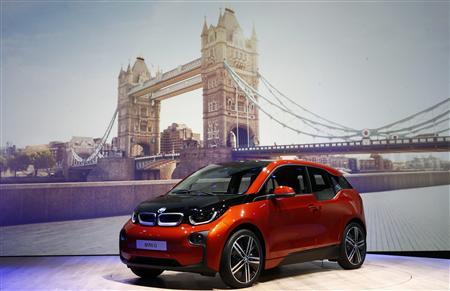BMW targets 'meaningful' sales with electric i-series
BMW is targeting a "meaningful" chunk of the electric-car market and expects demand to be driven up as urban populations rise, its sales chief said on Monday as he unveiled the company's battery-powered i3 model.
The world's biggest luxury carmaker has declined to give sales or production goals for the four-seater i3, to be followed early next year by a battery-powered i8 sports car.
|
 The new BMW i3 electric car is unveiled in front of a projected image of Tower Bridge at a ceremony in London, July 29, 2013. [Photo / Agencies] |
But the company already sees good sales potential for its first all-electric vehicle in affluent urban regions of California, Europe and Asia, sales chief Ian Robertson said. Some 92,000 people have expressed an interest in test-driving the i3 online.
"We're not entering to be a niche player," Robertson told reporters at the i3's launch event in London, also staged simultaneously in New York and Beijing.
"We're targeting meaningful sales," he said, in an electric-car market which BMW expects to grow to between 150,000 and 160,000 vehicles globally this year, from 7,000 in 2010.
Demand will rise as the number of people living in urban environments more than doubles to 4-5 billion over the next 20-25 years, Robertson said, citing United Nations projections.
While the i3's 34,950 euro ($46,400) price tag is well above the conventional BMW 3-Series saloon's, it also qualifies for tax breaks and generous upfront government incentives in markets such as Britain and the United States.
The company, which has trademarked its new "i" series through to i9, does not yet have another i-branded model in development to follow the i8, Robertson said.



















